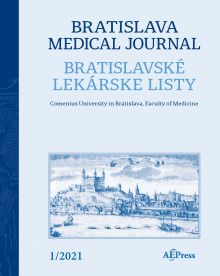Journal info
|
||||
Select Journal
Journals
Bratislava Medical Journal 2024 2023 2022 2021 2020 2019 2018 2017 2016 2015 2014 2013 2012 Ekologia - Ecology Endocrine Regulations General Physiology and Biophysics Neoplasma Acta Virologica Studia Psychologica Cardiology Letters Psychológia a patopsych. dieťaťa Kovove Materialy-Metallic Materials Slovenská hudba 2025Webshop Cart
Your Cart is currently empty.
Info: Your browser does not accept cookies. To put products into your cart and purchase them you need to enable cookies.
Bratislava Medical Journal Vol.123, No.4, p.236–243, 2022 |
||
| Title: The effect of temozolomide on apoptosis-related gene expression changes in glioblastoma cells | ||
| Author: Eva VIDOMANOVA, Zuzana MAJERCIKOVA, Katarina DIBDIAKOVA, Ivana PILCHOVA, Peter RACAY, Jozef HATOK | ||
| Abstract: BACKGROUND: Glioblastoma (GB) is the most common and biologically the most aggressive primary brain tumor of the central nervous system (CNS) in adults. Standard treatment for newly diagnosed GB consists of surgical resection, radiotherapy, and chemotherapy with temozolomide (TMZ). Despite numbers of studies, a resistance to chemotherapy is the major obstacle to successful GB treatment. OBJECTIVES: The aim of our study was to detect the sensitivity of glioblastoma T98G cells to TMZ treatment and subsequently to determine the expression changes of apoptosis-associated genes in glioblastoma cells. MATERIAL AND METHODS: The human glioblastoma cell line (T98G) was treated with specified concentrations of TMZ during different time periods. Their viability was measured by colorimetric MTT assay and the activation of the apoptotic pathway was determined by measuring the caspase 3/7 activity. Commercial pre-designed microfluidic array was used to quantify expression of human apoptosis-associated genes. RESULTS: The untreated control of T98G cell line against human brain total RNA standards reported significant changes in several apoptotic genes expression levels. We identified also a deregulation in gene expression levels between the TMZ treated and untreated T98G cells associated with apoptotic pathways. After 48 hours of exposure of T98G cells to TMZ, we observed a significant deregulation of seven genes: BBC3, BCL2L1, RIPK1, CASP3, BIRC2, CARD6 and DAPK1. These results can contribute to the importance of apoptosis in glioblastoma cells metabolism and effect of TMZ treatment. CONCLUSIONS: Identification of apoptotic gene panel in T98G cell line could help to improve understanding of brain tumor cells metabolism. Recognizing of the pro-apoptotic and anti-apoptotic genes expression changes could contribute to clarify the sensitivity to TMZ therapy and molecular base in healthy and tumor cells (Tab. 1, Fig. 2, Ref. 48). |
||
| Keywords: apoptosis, glioblastoma, temozolomide, gene expression | ||
| Published online: 16-Mar-2022 | ||
| Year: 2022, Volume: 123, Issue: 4 | Page From: 236, Page To: 243 | |
| doi:10.4149/BLL_2022_038 |
||
|
|
 download file download file |
|

